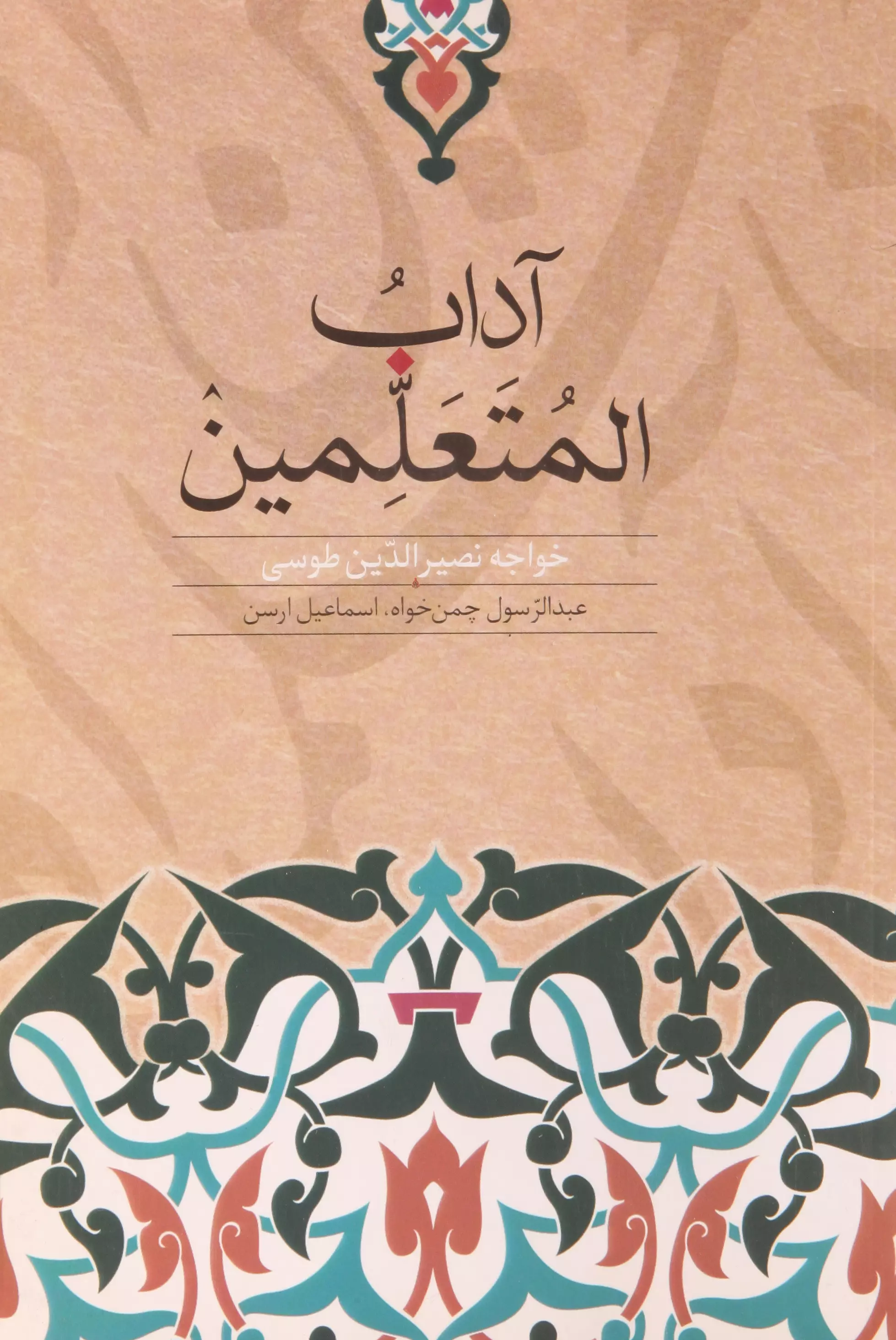Khāja Naṣīr al-Dīn al-Ṭūsī, Ādāb al-Mutaʿallimīn [Etiquette of Knowledge-Seekers], 1st ed., 1 vol., Qom: Fārūs Publication, 1395, 216 pp.
The importance of seeking knowledge from the point of view of Islam and the Prophet’s and the Ahl al-Bayt’s emphasis on the need to seek knowledge under all situations and for all people is obvious. However, this fact does not mean that Islam approves any kind of knowledge and any kind of
learning method; rather, in the verses of the Qurʾān and ḥadīths, the details related to teaching and learning are explained. One of these points is
learning etiquette for both teachers and students. Ādāb al-Mutaʿallimīn (Etiquette of Knowledge-Seekers) written by Khāja Naṣīr al-Dīn al-Ṭūsī (597-672 AH) elaborates on such etiquette for knowledge-seekers. It is one the most famous books in this field and has been taught in Shiʿa Seminaries for

centuries. This book is published both independently (emended by Sayyid Muḥammad Riḍā Jalālī Ḥusaynī) and as one of the 15 sections of the well-known Jāmiʿ al-Muqaddamāt.
Muḥammad b. Muḥammad b. Ḥasan known famously as Naṣīr al-Dīn al-Ṭūsī or Khāja Naṣīr is one of the most influential figures in the history of Islamic thought and one of the most important Twelver Shiʿa philosophers, scientists, and theologians. He was the founder of Marāghe observatory and a library with over 400,000 books. He authored more than 184 books on ethics, logic, theology, philosophy, mathematics, and astronomy, including Tajīrd al-Iʿtiqād, Asās al-Iqtibās, Akhlāq-i Nāṣirī, and Zīj-i Īlkhānī.
At the beginning Ādāb al-Mutaʿallimīn, which consists of 12 chapters, Khāja Naṣīr states that it is difficult for some of the seekers of knowledge to learn, and on the other hand, it is possible that for various reasons, some of those who try to learn do not reach their goal. Based on this, in this book, he tried to briefly describe the ways and manners of learning as he heard from his professors or read in books. He has dedicated the first chapter to the discussion on the nature of knowledge and its superiority over other pursuits, and referring to ḥadīths and rational arguments, considered it as a means of achieving eternal happiness and as food for the soul.
One of the most important issues about learning knowledge is intention. The second chapter deals with this critical issue and emphasizes that the student’s intention should be to please God and eliminate ignorance, and he should walk with this goal, on this path, with effort, passion and patience. In the third chapter, Khāja Naṣīr elaborates on how to choose s field of study, professor and classmate, and provides practical solutions for these three significant issues. According to him, the student should choose the best fields that are useful for his religion and his future. He should choose professors from among the most knowledgeable, pious, and old people, and he should spend time for this selection. Accordingly, when a student enters a city, he should search for two months to get to know the professors and then choose the best of them and not leave them and remain steadfast in this way to reach his goal. One has to be very careful in choosing a classmate. Among the characteristics of a good classmate is that he is not lazy and talkative and does not seek sedition and corruption.
The fourth chapter is about the seriousness in learning without which, the student will not reach his destination. A student should always review what he has read, the best time for this being midnight to dawn. Here, Khāja Naṣīr considers overeating and sleeping to be the cause of laziness and advises moderation and attention to cleanliness. The fifth chapter is dedicated to the discussion about the time and amount of lessons that the student learns. Also, one of the important points of education is questioning and discussion/debate, provided that it is far from prejudice and anger, since discussion is more useful than repeating the lesson. Therefore, it is necessary for the student to always reflect on what he has studied and get used to this work.
The sixth chapter is about trust in God. A student should devote all his efforts to his studies, the enjoyment of which is worth more than all worldly pleasures, and he should not think about collecting money. The seventh chapter of the book is about the time of studying. Although from birth to death one should strive to acquire knowledge, the best period for it is the youth and the most favorable times for indoctrination and repetition is at dawn and between maghrib and ʿishā prayers.
The eighth chapter of Ādāb al-Mutaʿallimīn is about the usefulness of the teacher’s advice and his kindness towards the student. People of knowledge should be kind and instructive and away from jealousy and try to train excellent students. The student should also avoid any quarrels and enmity and tolerate stupidity and lack of wisdom. The ninth chapter is about the method of benefiting the student from the teacher. A student should always be eager to learn and always use a pen and write down everything he hears from the scholars, so as not to miss anything. He should seize the opportunity and accept the suffering in the pursuit of knowledge.
The tenth chapter is about piety. The more pious a student is, the easier it is for him to study and the more beneficial it is. Piety also prevents overeating, oversleeping, and talking too much, just as backbiting and hanging out with those who talk a lot causes loss of life and time. The eleventh chapter contains a discussion on what causes retention or forgetting. According to Khāja Naṣīr, the most important factors in strengthening memory are seriousness in learning, eating less, saying night prayers, and reciting the Qurʾān. The author also mentions some useful foods to strengthen memory. What causes forgetfulness and weak memory is committing sins, depression and infatuation with the world, which darkens the heart. Some effective foods in forgetfulness are also mentioned.
Finally, in the twelfth chapter, there is a discussion about what causes the gain or loss of sustenance and what shortens or lengthens life. Here, after mentioning a hadith from the Holy Prophet (s) that prayer increases one’s sustenance and goodness and piety increase life, Khāja Naṣīr goes on to explain some of the material and spiritual causes of poverty and shortening life.
Reading Ādāb al-Mutaʿallimīn is highly recommended for those who are interested in acquiring knowledge according to Islamic etiquette and traditions and get to know the precise and delicate techniques in this direction.
You can read this book from this link
